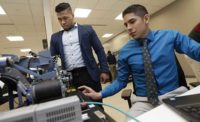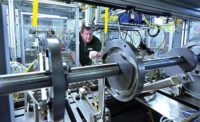Every industrial revolution has eliminated old jobs and created new ones. In many cases, manufacturers weren’t aware that these new jobs were even necessary. To succeed in this age of Industry 4.0, manufacturers will need to do more than just develop a workforce capable of dealing with upcoming technologies, they will need to foster a workplace culture of problem-solving and continuous improvement.
That was the advice of Tim Waldo, workforce development consultant with the University of Tennessee Center for Industrial Services, one of three presenters in a workshop on lean manufacturing and Industry 4.0 that was held April 4, the opening day of The ASSEMBLY Show South in Nashville, TN.
“In many cases, we look at automation and Industry 4.0 as a way to deal with our current personnel issues: We can’t find enough workers. We have a skills gap,” Waldo told an audience of some 60 manufacturing professionals. “That’s true, to an extent. But we will also need people who can fill new jobs and provide new skill sets.”
Indeed, Waldo pointed to a recent study by the Manpower Group that identified 165 potential new job roles that will be created by Industry 4.0. These include digital manufacturing engineer, predictive maintenance systems specialist, machine learning specialist and cobot specialist.
“Where are we going to find these people?” Waldo asked. “We can try to hire them from the outside, but we’re already dealing with a skills gap today, and it’s not going to get any better.”
Instead, manufacturers are well-advised to invest in the skills of their existing workforce. “Internal up-skilling is difficult, but it’s well worth the effort,” Waldo said. “Your workforce may already have some diamonds in the rough who would be really good at some of these digital-based jobs. But, if you’re not looking for those folks, you won’t find them. We need to start thinking about how we can help our workers make this transition, and how they can help us make this transition.”
Waldo conceded that it will take time to up-skill workers. “You need to work on workforce development at the same time you’re implementing shiny new toys like cobots,” he said.
Waldo identified several workforce challenges related to implementing Industry 4.0. For starters, many manufacturers don’t yet understand what “digital transformation” even means. Similarly,
manufacturers will need people capable of thinking about systems rather than individual workstations. And, manufacturers will need to create a culture that can quickly adapt to change.
The lean and Industry 4.0 workshop was one of four conference tracks held on the opening day of The ASSEMBLY Show. Other tracks focused on automated assembly systems; electric vehicle design and assembly; and methods for increasing reliability of electronic assemblies.
The ASSEMBLY Show South continues April 5-6. For more information, click here.




